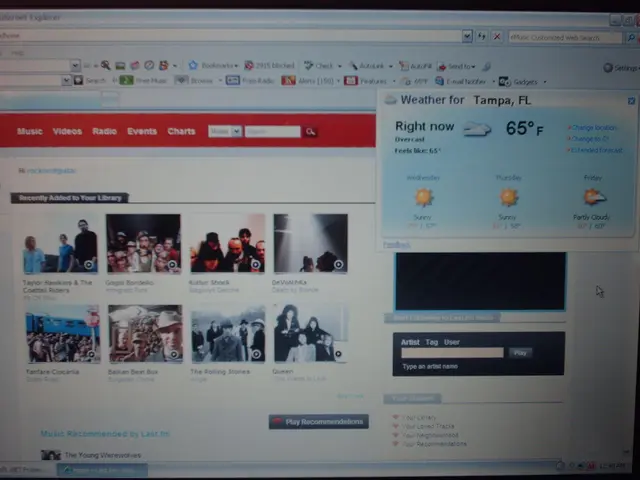A Necessary Evolution in Digital Rights
Regulation Pushes Digital Spaces to Address Deceptive AI Practices: The No Fakes Act Enforces Action
As technology advances, so does the potential for deception. The rise of deepfakes—AI-generated content that mimics real individuals—has sparked concerns across the entertainment industry. In response, more people are advocating for clearer protections, such as the No Fakes Act.
The Dark Gap in Legal Protections
The No Fakes Act hasn't sprung out of nowhere. It emerged as a response to a decades-long struggle to apply outdated laws to modern problems. As AI tools became more accessible, the gaps in legal protection grew too wide to ignore.
For years, protecting someone's name, image, or voice relied on the "right of publicity." Yet, these laws were written before the internet and never considered AI-generated content. As the tech improved, the issues multiplied. Deepfake videos of politicians went viral, AI-generated songs copied real artists, and entire albums were posted under famous names, despite no human involvement.
The Solution: A Federal Bill for the Digital Age
The No Fakes Act is a federal bill introduced in 2023 by a bipartisan group of senators. Its mission is straightforward: to prevent the unauthorized use of a person's voice, face, or likeness in AI-generated content. This includes fake ads, imposter songs, and misleading endorsements without permission.
This legislation fills critical gaps in today's legal system, giving stronger protection to individuals and placing more responsibility on platforms, studios, and agencies that host or publish this content. The bill aims to challenge the notion that platforms are merely neutral spaces, reinforcing the idea that everyone deserves control over their voice and likeness, whether they're Taylor Swift or Joe Blogs.
Navigating the New Reality: Platforms Adapt
For platforms, the rise of synthetic media isn't a future concern—it's already reshaping legal, cultural, and commercial systems. Major platforms like YouTube, Google, Disney, and TikTok are taking the risks of AI-generated content more seriously. They're introducing clearer rules, updates to policies, and improved detection tools.
However, enforcement remains challenging due to the early stages of detection technology, absent metadata, and the sheer volume of uploads. Still, platforms risk losing credibility if they put off action until perfect detection tools arrive, or public pressure becomes overwhelming. The No Fakes Act offers a proactive framework for defining digital consent and preventing misuse—a lifeline for companies navigating the future of content moderation.
The Human Artistry Campaign: Shaping the Future of AI Ethics
Industry groups are stepping in to help the creative industry adapt to AI. One leading example is the Human Artistry Campaign, supported by organizations like the RIAA, SAG-AFTRA, and Universal Music Group. The campaign promotes seven key principles, including the need for consent, credit to original creators, and fair compensation for artists. These principles form the foundation for ethical AI use, safeguarding artists' work and protecting rights in an emerging digital landscape.
Protecting the Priceless—The Evolving Role of Talent Agencies
Talent agencies are adapting their services to better protect the artists they represent. For instance, Creative Artists Agency (CAA) helps clients manage digital risks alongside traditional career support, including monitoring for unauthorized use of their voice, face, or performance online. Record labels are following suit, entering discussions with AI music companies to define how copyrighted music can be used in AI-generated content.
The industry is shifting towards long-term systems that stress consent, accountability, and artist involvement. The goal is to prevent misuse before it happens, ensuring a safer, more honest digital environment for everyone.
In a World of Deepfakes, Truth Prevails
Deepfakes blur the line between reality and illusion. But the No Fakes Act offers a beacon of hope, fostering accountability and digital consent in the age of AI. Platforms that align with this legislation and focus on transparency and ethical AI adoption will help create a more trustworthy digital landscape—a future where everyone can maintain control over their digital likeness.
References
- No Fakes Act, 2023
- The Hollywood Reporter: The No Fakes Act Aims to Outlaw Deepfakes Using Celebrities' Voices and Images
- Variety: Why the Entertainments Industry Supports the No Fakes Act
- Billboard: The No Fakes Act: What It Does and Why It Matters
- The Washington Post: Tech Giants Back Federal Bill to Crack Down on Deepfakes
- As the entertainment industry faces the rise of deepfakes, the No Fakes Act, introduced in 2023, aims to prevent unauthorized use of a person’s voice, face, or likeness in AI-generated content, such as fake ads or imposter songs.
- With the help of industry groups like the Human Artistry Campaign, supported by organizations like the RIAA, SAG-AFTRA, and Universal Music Group, the entertainment industry is focusing on principles like consent, credit to original creators, and fair compensation for artists, shaping the future of AI ethics.








